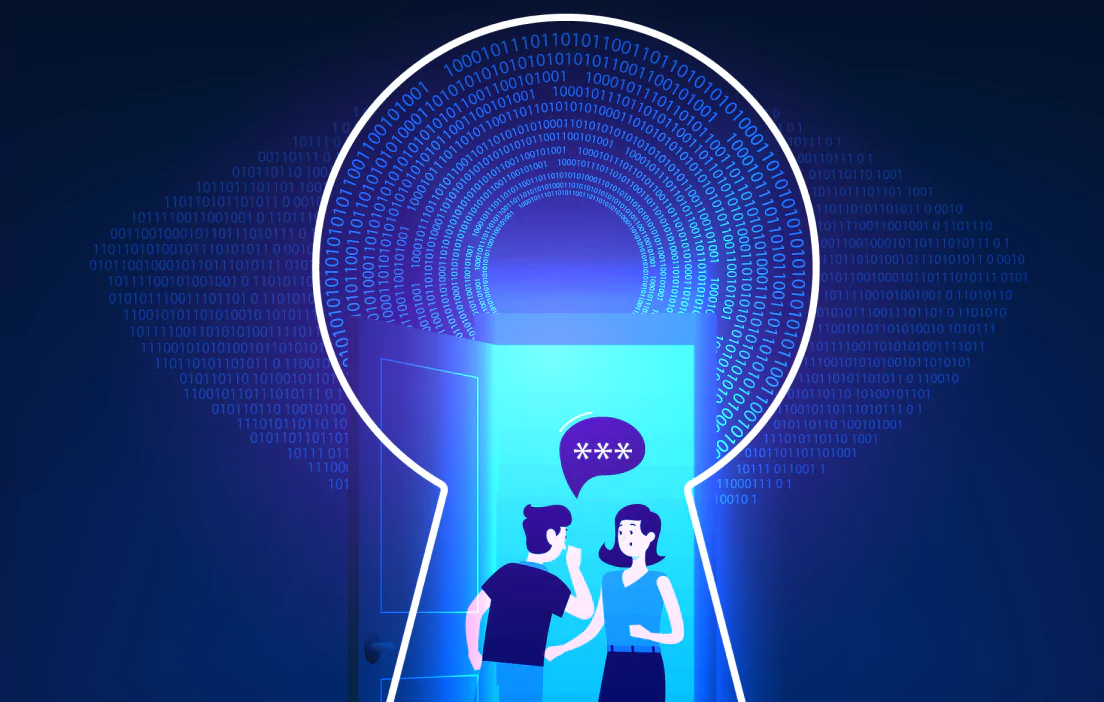In the not-so-distant past, keeping your secrets safe meant whispering behind closed doors or hiding your diary under your mattress. But in today's world of cat memes and online shopping sprees, even your toaster has a digital agenda, and the rules of the game have changed.
Netflix, a global streaming giant, handles millions of daily payment transactions. They recognized the imperative of fortifying data security for customer financial information and implemented Tokenization to secure payment card data during payment processing.
Netflix's successful adoption of Tokenization for securing payment data underscores the critical role that this data security measure plays for organizations tasked with safeguarding sensitive customer information. Netflix not only assures its customers of a secure and hassle-free subscription experience but also upholds the highest data protection and regulatory compliance standards.
Today, as an organization or individual, safeguarding your data is paramount for many reasons. The surge in cyberattacks and data breaches presents a clear and present danger. Additionally, preserving the privacy of personal and sensitive information is an ethical imperative, safeguarding individuals from identity theft and preserving their rights.
Compliance with stringent data protection regulations such as GDPR, HIPAA, and CCPA is no longer just a best practice but a legal necessity imposed by governments and regulatory authorities worldwide. Data security serves as the cornerstone of uninterrupted business operations, guaranteeing smooth functioning and minimizing the potential for disruptive downtime resulting from security breaches.
What is Tokenization?
Data tokenization is a technique in data security that involves replacing sensitive data elements with format-preserving tokens. When data is tokenized, sensitive information, such as credit card or social security numbers, is replaced with unique, irreversible tokens.
These tokens are typically random characters or symbol strings with no inherent meaning or value. These tokens have no intrinsic meaning, making it impossible for attackers to reverse-engineer the original data. Tokenized data retains its format and structure, making it more usable for applications and analytics while maintaining security.
Several types of sensitive datasets need to be protected through robust security measures. Some examples include:
- Personal Identification Information (PII): It includes names, Social Security Numbers, passport numbers, driver's license numbers, addresses, and other personal information. When PII is compromised, it can lead to identity theft, financial fraud, and unauthorized access to various accounts.
- Financial Data: Examples include Credit card numbers, bank account information, financial transaction records, and even mobile wallet details from mobile commerce transactions. Breaches involving financial data can result in unauthorized charges, fraudulent withdrawals, and potentially devastating financial losses for individuals and businesses.
- Healthcare Data: Includes medical records, patient diagnoses, treatment histories, and health insurance information. Healthcare data breaches can lead to medical identity theft, unauthorized access to sensitive health information, and insurance fraud. Patients' privacy may be violated, and their medical records could be altered or misused.
- Corporate Data: It includes organizational data such as Intellectual property, trade secrets, financial reports, and customer databases. Corporate data breaches can result in significant financial losses, damage to a company's reputation, and compromised competitive advantages. Intellectual property theft can harm a company's innovation and market position.
- Government Data: Examples include Classified information, government databases, and citizen records. Government data breaches can compromise national security, expose confidential information, and disrupt government operations.
Moving and storing these datasets on the cloud warrants strict protection, residence, and governance rules. Tokenization of data in the cloud offers a strong layer of security and privacy, making it a valuable approach for organizations looking to protect sensitive information while leveraging the benefits of cloud computing.
Understanding the Fortanix Tokenization solution
At Fortanix, Tokenization is designed to address the critical need for protecting sensitive data while maintaining its usability and ensuring regulatory compliance. Fortanix Tokenization offers strong data protection by replacing sensitive information with unique tokens.
Fortanix provides Tokenization-as-a-Service, offering Tokenization as a cloud-based service, simplifying implementation and management. This allows organizations to leverage Tokenization without significant infrastructure investments.
Some of the primary features and advantages of our tokenization offering are:
- Reversibility: Fortanix Tokenization is reversible, meaning that the original data can be retrieved when needed for legitimate and authorized purposes. This reversibility is crucial for applications where tokenized data must be de-tokenized to perform specific operations.
- Deterministic: Deterministic Tokenization is a property where the same input data consistently produces the same output token when the same tokenization key is used.
- Vault-less: Vault-less tokenization eliminates the need for a centralized token vault or database to store the mapping between tokens and original data. Fortanix vault-less tokenization relies on advanced NIST (National Institute of Standards and Technology) approved cryptographic techniques to generate and manage tokens without central storage. This reduces the risk associated with storing sensitive data and its associated tokens in a centralized location. Without a centralized vault, there is no single point of failure or a single target for attackers.
- Advanced Data Masking: A user can choose to dynamically mask an entire field of tokenized data or part of the field based on users or groups. Comprehensive role-based access control can be configured for Tokenization and partial or Full detokenization of sensitive data.
- Diverse set of tokenization data types: The solution supports a vast and extensively configurable set of Tokenization Data Types that can be used for any tokenization requirements.
- Highly Scalable: Fortanix offers scalable tokenization solutions suitable for organizations of diverse sizes. This scalability allows businesses to adapt their tokenization infrastructure to meet evolving security needs. Being Vault-less, Fortanix tokenization can accommodate tokenizing large volumes of data. It can easily adapt to organizations' growing data security needs without requiring significant infrastructure changes.
- Integration Flexibility: Fortanix Tokenization can be integrated seamlessly through Restful APIs into existing systems, applications, and databases. It provides compatibility with various data formats and structures, making it versatile for different use cases.
- Performance and Efficiency: Fortanix's tokenization solutions are designed for high performance and minimal latency, ensuring tokenization processes do not disrupt critical business operations or slow down application performance.
- Monitoring and Audit Trails: Fortanix Tokenization solutions offer tamper-proof monitoring and auditing features, allowing organizations to track tokenization activities and maintain comprehensive audit trails for compliance, analytics, and auditing purposes.
Fortanix Tokenization Key Management
Fortanix Tokenization employs robust and best key management practices to enhance the security and control of tokenized data.
Fortanix Tokenization key management practices are designed to provide organizations with the highest security and control over encryption keys. This ensures the confidentiality and integrity of tokenized data, reduces the risk of data breaches, and supports compliance with data protection regulations.
Fortanix Tokenization offers secure backup and recovery mechanisms for encryption keys. This ensures that keys can be restored during hardware failure or other disasters without compromising security.
Tokenization keys are securely stored within the Fortanix FIPS 140-2 Level 3 HSMs that provide a hardware-based secure environment for key protection, making it extremely difficult for unauthorized access.
Benefits of Data Tokenization
- Tokenization reduces the attack surface for cybercriminals. Since sensitive data is not stored in its original form, attackers have fewer opportunities to target valuable information, mitigating the risk of data breaches.
- Tokenization solutions can be easily integrated into existing systems, applications, and databases. This adaptability makes it feasible to protect sensitive data across diverse environments.
- Organizations have control over data retention policies and de-tokenization processes. Authorized users can access the original data when necessary, ensuring legitimate data use.
- Tokenization can help organizations meet data residency requirements by keeping sensitive data within specific geographic boundaries while using tokens for cloud processing or storage.
- Tokenization helps organizations comply with data protection regulations (e.g., GDPR, HIPAA, CCPA) by reducing the exposure of sensitive data. It ensures that personally identifiable information (PII) and other sensitive information are adequately protected.
Conclusion
Data tokenization is a stalwart guardian of sensitive information in the ever-connected and data-driven world. It is the most effective solution to the perennial challenge of protecting sensitive data while allowing legitimate use and analysis.
Choosing the right tokenization solution or service provider is paramount for organizations seeking to protect sensitive data effectively. A robust solution guarantees the confidentiality and integrity of tokenized data and safeguards it from breaches and unauthorized access.
Fortanix Tokenization is a powerful data security strategy, helping organizations safeguard sensitive information, meet compliance requirements, and ensure the integrity of their operations. Fortanix aligns with industry best practices for data tokenization, ensuring the security of encryption keys used for Tokenization. We are committed to staying current with security practices and technologies to future-proof your data protection efforts.











